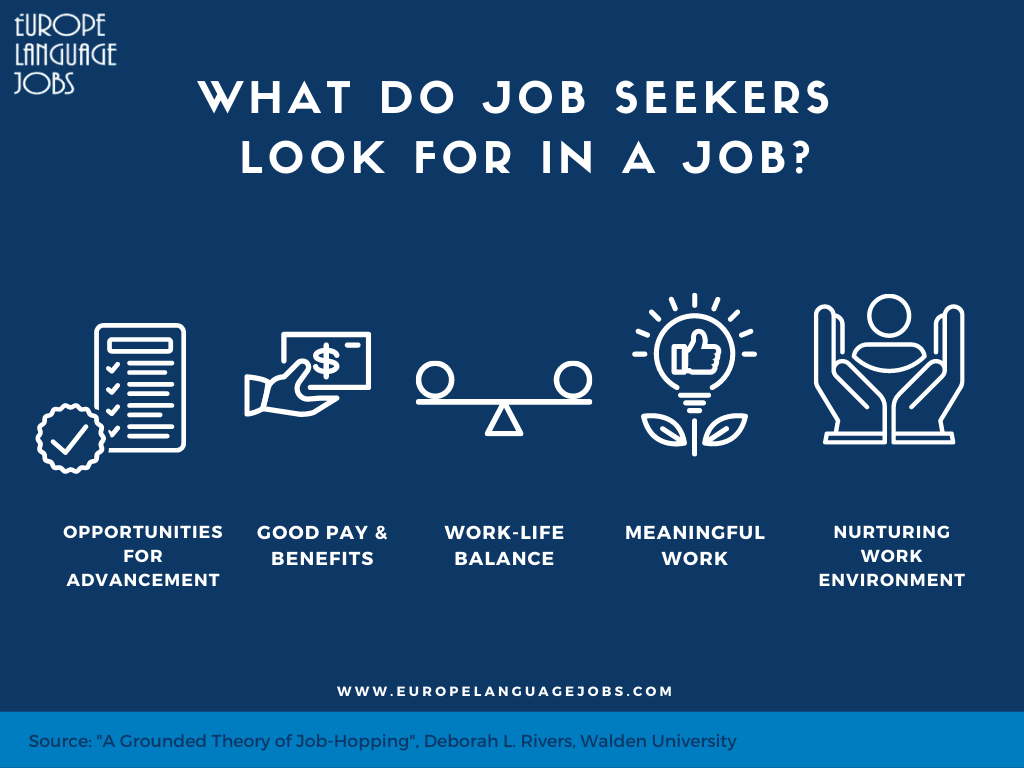The phenomenon of job hopping has been on everyone’s lips for quite some time. It is discussed by job seekers and employers alike - both in positive and negative ways. It is yet to be established whether job hopping will harm your career or kick start it, but we are here to explain the topic in more detail and allow you to develop your own opinion.
- What is considered job hopping?
- Reasons for job hopping
- Will job hopping harm your career?
- How to explain job hopping in an interview?
- Job hopping: advantages and disadvantages
What is considered job hopping?
While there is no formal definition of job hopping when it comes to time, it is usually described as holding a position for less than 2 years. That is not to say that if you have been recently promoted from a Sales Representative to a Sales Manager in your company, you are job hopping. For one to be considered a job hopper, they need to change not only their positions, but also the organisations or companies they work in.
Reasons for job hopping
The reasons for changing jobs often might be personal and vary from worker to worker. However, some of them are more prominent than others:
-
Finances - without a doubt, it is less time-consuming to find a new, better-paid position than to wait for a promotion at your current company (which might never even come). Even if one is satisfied with their job and gets along with their team, they might be tempted to switch their position for a better-paid one.
-
Dissatisfaction - in contrast to the previous point, the case might sometimes be that one might be happy with their salary, but not with the working environment. Studies show that many employees nowadays are overqualified for the positions they hold (and, what comes with it, often underpaid). It is easy to burn out quickly when we don’t feel like we’re reaching our full potential in our current role and that there might be something better out there waiting for us.
-
Searching for the perfect job - it is proven that it is between the age of 18 and 24 when we change our jobs most often. Job hopping is much easier for those who haven’t yet started their own families and can switch positions or even locations without needing to worry about how this might affect their spouse or children. It is also the age when one discovers themselves, learns which role suits them the best. Before we make serious commitments and find a position that works for us, we are prone to hop jobs more frequently.
-
Relocation - wandering souls sometimes can’t simply stay in the same place for more than 2 years. They feel the need to be constantly on the move, and if they are not lucky enough to be able to execute their role remotely, what comes hand in hand with frequent travels is the necessity to change companies.
-
Personal development - people change. This is unavoidable. While a year ago, one might have been satisfied with working for a growing start-up and being a part of a small team, they might now feel the desire to contribute to something larger - a bigger enterprise offering more opportunities for development.
Or the other way round: someone could have been fine with being just an element in the well-oiled machine of a global company, but is now tired of being a number and longing for a sense of belonging. The perfect balance between those two extremes is not easy to find, so it can sometimes take years of trying out new positions in various companies for us to choose the career that suits us best.
The graphic below represents the five things job seekers list as the most significant while looking for a job, according to a doctoral study by Deborah L. Rivers from Walden University.
These five elements correspond with the reasons why one might become a job hopper, searching for a role that will provide them with the perfect combination of them all:

Will job hopping harm your career?
We asked our HR Manager here at Europe Language Jobs, Donato, to answer this question for us. As a recruiter who reads dozens of CVs every day and constantly makes decisions about whom to hire and why, we believe he is the best-suited person to tell you how job hopping is actually perceived by hiring managers.

The conclusion? Rather than worry about whether job hopping is good or bad in general, we should ask ourselves how much job hopping is too much. Donato provides a direct answer to this question - while a streak of positions we have only held for a year or two at a time might not cross us out, we should avoid switching jobs every few months.
Employers originally prefer to look for longer commitment, because the process of hiring someone new constantly is incredibly time-consuming. Companies invest a lot in the training of new employees and prefer to have them stay for longer than it took to introduce them into the company’s life in the first place.
As we can see, recruiters understand the reality that job-hopping has become nowadays, but if they see a history of three or four positions where a candidate only lasted a few months, it might scare them off.

Turnover rate is the percentage of employees leaving the company over a certain period. An example of businesses that realise their turnover rate might be higher are startups - working in a company that is only just developing has its charm, but it certainly doesn’t provide as many growth opportunities (such as paid training or access to various courses) as companies operating on a global scale.
Some might feel rewarded by watching the start-up grow into something more and will want to hold their position for as long as possible to witness the development. Others will consider it a good opportunity to take their first steps on the newly-opened career path before they gain enough qualifications to find a role in a bigger enterprise where they can climb up the ladder.
It is also common for certain types of businesses to only have employees sign fixed-term contracts - customer service jobs oftentimes fit into this scheme, but they are also in very high demand, so a new position is usually not extremely challenging to find.
How to explain job hopping in an interview?

This is what Donato started off the conversation about job hopping with. Meaning: nowadays, recruiters don’t automatically drop candidates with job hopping tendencies onto the “NO” pile. It can be okay to have a history of frequent career changes behind you - as long as you can explain it properly.
The best advice? Be honest. If you have been job hopping due to travelling, admit it. Your experience living in different cultures will be perceived as a huge advantage. If you have just been looking for the right company, say that up until now, you haven’t really felt like the positions you have been holding allowed you to spread your wings fully.
Note: this should highlight how ambitious you are, not undermine the employers you had previously worked for. One thing that is an absolute no while talking to recruiters - regardless of whether you’re a job hopper or not - is to badmouth former bosses.
Job hopping: advantages and disadvantages
Still on the fence about whether job hopping pays off? Now that we’re sure we’re familiar with what the phenomenon means and how recruiters approach it, it’s time to go over the pros and cons to establish your own opinion.
Advantages of job hopping:
-
Development - on the one hand, it is a common belief that staying in one position for a short time might give you inconsistent experience and prevent you from benefiting from the company’s growth opportunities to the fullest. On the other, however, there is only so long you can keep learning new things in the same environment, so changing teams and companies can introduce you to a new mindset and new resources.
-
Higher salary - as we have already mentioned, job hopping is a much quicker way to a bigger paycheck than waiting for a promotion that may or may not come. We hardly ever change our position for a lower-paying one (unless our motivation is a better work environment and we are willing to take a pay cut to achieve it), so usually, frequent changes of jobs equal frequent pay raises.
-
Experience - if you are job hopping not only between different companies within the same sector, but are also trying your hand at various positions, then you will gain experience in many fields. The downside of this, however, is that you might find it difficult to keep doing it for long. If at some point, your CV starts resembling a job board rather than a consistent resume showing development in a specific direction, you might not be getting many calls from recruiters.
-
Variety - if you’re the type who appreciates a little bit of dynamics in their life, then job hopping might be the kind of lifestyle you’d be interested in. Starting over often means meeting a lot of new people, discovering a lot of new places, and gaining a lot of new experiences. It also helps build your network - the more contacts in more places, the better.
Disadvantages of job hopping:
-
Lack of stability - even if the concept of job hopping can be exciting at first, it might get tiring after a few years. Those who don’t adjust to changes well and cringe at the thought of having to move from the home they have been living in for the past ten years probably won’t find this kind of lifestyle enticing.
Job hopping also means going through a lot of recruitment processes in a short time - as they are known to be stressful, no matter how many times one has gone through them, it might be nerve-wracking to subject oneself to them multiple times in a relatively short time.
-
Controversy - despite open-minded recruiters such as Donato showing an understanding of the fact that job hopping may be done for different reasons and is nowadays becoming more of a norm than an anomaly, we cannot guarantee that all hiring managers will perceive it in that way. Some companies who value long-term commitment might acquire new employees based on their predicted loyalty to the firm.
Job hopping is by no means a new occurrence (studies show that the phenomenon was no less popular for Baby Boomers and Gen Xs than it is for Millenials and Gen Zs). Still, as with any controversial concept, next to those who are willing to accept it, there will also be others who demonstrate hesitation.
-
Disturbed integrity - changing jobs too often might result in a lack of sense of belonging. Even if you stay in a company long enough to develop bonds with your coworkers, if you form too many relationships in too many places, you might start to question where your loyalties really lie. Being a part of too many communities may eventually lead to not truly belonging anywhere in particular.
If you’re more of a lone wolf, this might not pose a problem, but people are social animals, after all. An abundance of colleagues to keep in touch with can cause a headache, and missing real attachment to anyone or anywhere in particular might start to feel lonely.
-
Risk of commitment issues - if one goes too long without sprouting roots, it may impact their ability to do so in the long run. Of course, that is not to say that every single job hopper out there is incapable of committing to anyone or anything. The rules that guide us in our professional life don’t necessarily have to reflect who we are in private. Still, some habits form outside of our control and if we spend a few solid years hopping from job to job, we might be in danger of developing problems with commitment.
Once one gets used to frequent change, the concept of staying somewhere for longer may eventually seem boring. At some point, our current chair starts feeling uncomfortable, the call of the unknown becomes unbearable, and before we know it, we’re scrolling through LinkedIn offers again. It is not a given risk - but still a risk.
Job hopping is definitely one of those topics that aren’t black and white - without a doubt, it falls into the gray sphere. Whether it is a good way to live your life depends on one’s personality, ability to adapt to changes, circumstances, and the situation they are in. For some, it may be a necessity - while for others, it’s a choice.
We want to hear your opinion. We have explained the concept of job hopping, presented an expert’s opinion on it, and listed the pros and cons of this kind of lifestyle. Are there any other advantages or disadvantages you could think of? Is job hopping bad? How much job hopping is too much? Does it sound like a way of living you would be interested in?
Maybe you’re an experienced job hopper and would like to share your insights? The comment section is yours!
Feeling inspired? Visit our blog for more career advice! How can you be sure the information we provide is top-notch? We are a group of professionals working with recruiters, career coaches, and HR specialists from all over the world!
Trust our experience and let us help you find a new job in Europe!

















Linda Toivanen1y ago
This was a really interesting post! I've personally encountered negative reactions from recruiters about job hopping and this really opened my eyes more to both sides. So thank you for this!
This was a really interesting post! I've personally encountered negative reactions from recruiters about job hopping and this really opened my eyes more to both sides. So thank you for this!